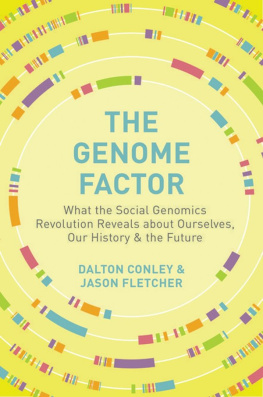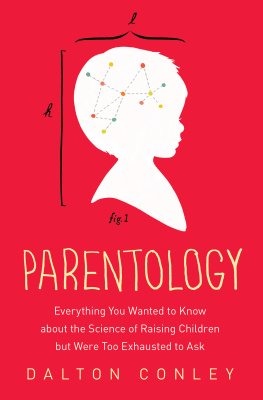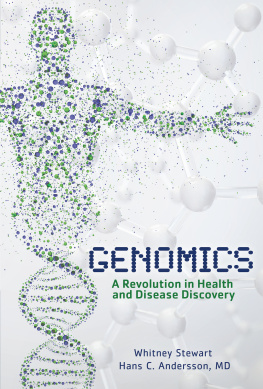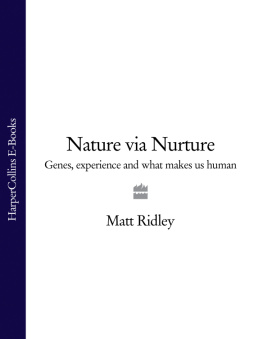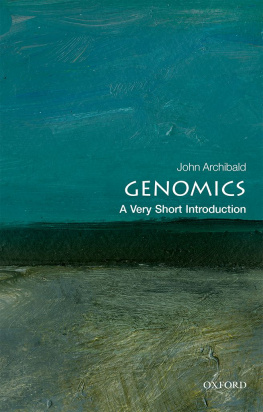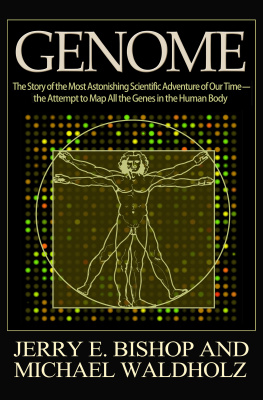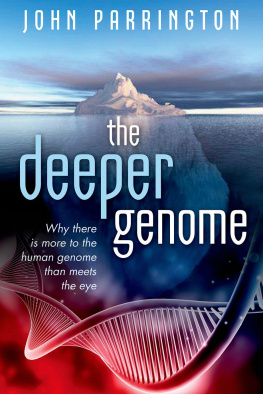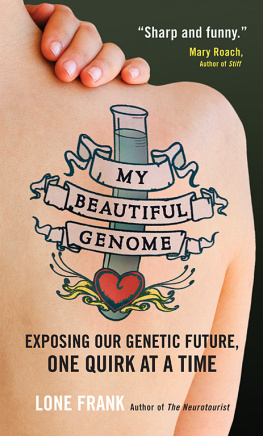THE GENOME FACTOR
THE GENOME FACTOR
What the Social Genomics Revolution Reveals about Ourselves, Our History, and the Future
DALTON CONLEY
AND JASON FLETCHER
PRINCETON UNIVERSITY PRESS
Princeton and Oxford
Copyright 2017 by Princeton University Press
Published by Princeton University Press, 41 William Street, Princeton, New Jersey 08540
In the United Kingdom: Princeton University Press, 6 Oxford Street, Woodstock, Oxfordshire OX20 1TR
press.princeton.edu
All Rights Reserved
Library of Congress Cataloging-in-Publication Data
Names: Conley, Dalton, 1969 author. | Fletcher, Jason, author.
Title: The genome factor : what the social genomics revolution reveals about ourselves, our history, and the future / Dalton Conley and Jason Fletcher.
Description: Princeton : Princeton University Press, [2017] | Includes index.
Identifiers: LCCN 2016036571 | ISBN 9780691164748 (hardback)
Subjects: LCSH: GenomicsSocial aspects. | Heredity, HumanSocial aspects. | Equality. | BISAC: SOCIAL SCIENCE / Sociology / General. | SCIENCE / Life Sciences / Genetics & Genomics. | SOCIAL SCIENCE / Disease & Health Issues.
Classification: LCC QH438.7 .C656 2017 | DDC 576.5dc23 LC record available at https://lccn.loc.gov/2016036571
British Library Cataloging-in-Publication Data is available
This book has been composed in
Sabon Next LT Pro & Montserrat.
Printed on acid-free paper.
Printed in the United States of America
1 3 5 7 9 10 8 6 4 2
CONTENTS
ACKNOWLEDGMENTS
At least three key programs helped set up the foundation for our collaboration for this book. The first is the Integrating Genetics and Social Science Conference (IGSS), directed by our friend and collaborator Jason Boardman. One of our early interactions was Conley dismantling Fletchers paper at the first annual conference, which is now in its seventh year at the University of Colorados Institute for Behavioral Science. This conference has formed the epicenter of much of the science we highlight in the book, and we thank Jason Boardman, Jane Menken, Richard Jessor as well as the staff and funders of the conference, Population Association of America, the NICHD, IBS, and Colorado Population Center, among others, for such an invigorating and engaging (and continuing) set of events. The second is the Robert Wood Johnson Foundation Health & Society Scholars Program at Columbia University. Fletcher spent 20102012 in the program, which allowed us to discuss joint work that set some of the groundwork for the book. Fletcher also deeply thanks Peter Bearman, Bruce Link, and Zoe Donaldson for advice, support, and engagement during this time as well as former colleagues at Yale who cultivated this research direction, especially Paul Cleary, Joel Gelernter, and Mark Schlesinger. Conley is grateful to the NYU biology department for allowing him to go back to school to learn the difference between siRNA and miRNA and piRNA. And thanks also to the NYU administration that countenanced such an unusual arrangementespecially to Provost David McLaughlin.
Along the way, we have benefited from advice and support from a large number of colleagues and collaborators. Our friends and collaborators in this domain of research include but surely are not limited to (alphabetically): Dan Belsky, Daniel Benjamin, Jason Boardman, Richard Bonneau, David Cesarini, Justin Cook, Christopher Dawes, Ben Domingue, Kathleen Mullan Harris, Phillip Koellinger, Thomas Laidley, Steve Lehrer, Patrick Magnusson, Matthew McQueen, Michael Purugganan, Emily Rauscher, Niels Rietveld, Lauren Schmitz, and Mark Siegal. They have all substantially enhanced our research efforts as well as the wider field. We also thank Jason Boardman, Justin Cook, Mitchell Duneier, Angela Forgues, Joel Gelernter, Joel Han, Ryne Marksteiner, Ann Morning, Jessica Polos, Matthew Salganik, and Maria Serakos for their extensive comments on various chapters of the book. In the Princeton Sociology Department, Amanda Rowe copyedited several versions of the manuscript, improving it with each pass.
We have been generously funded over the last years by a variety of organizations.
Conley gratefully acknowledges the Russell Sage Foundation for both his time as a visiting scholar in residence there as well as the subsequent awarding of a research grant that supported some of this work (Grant # 83-15-29: GxE and Health Inequality across the Life Course). Conley also thanks the John Simon Guggenheim Foundation for its Individual Fellowship (In Search of Missing Heritability). Finally, he would like to acknowledge the National Science Foundation, which supported his second Ph.D. studies in the form of the Alan T. Waterman Award (SES-0540543). Internal research support from both New York University and Princeton University also made this work possible. Visiting stints at the University of Auckland, Bielefeld University, Yale Universitys Center on Inequality and the Life Course and at the Institute for Behavioral Science at the University of Colorado at Boulder were all helpful opportunities for Conley to develop the ideas herein. In particular, he would like to thank hosts Richard Breen (Yale, now Oxford); Peter Davis (Auckland); Martin Diewald (Bielefeld) and Jason Boardman (Colorado).
Fletcher gratefully acknowledges the Robert Wood Johnson Foundation Health & Society Scholars Program and the William T. Grant Foundation Scholars Program for career development support. Fletcher is particularly grateful for the advice from Adam Gamoran, Richard Murname, David Deming, Joshua Brown, Patrick Sharkey, and Jelena Obradovic at the Scholars Retreat workshop. Fletcher also is grateful for research support and generous colleagues from the La Follette School of Public Affairs, Department of Sociology, Center for Demography and Ecology, Center for Demography of Health and Aging, and Institute for Research on Poverty at the University of Wisconsin-Madison.
We also have benefited from numerous kind souls at Princeton University Press who have expertly helped us at every step. Thanks to Eric Schwartz who acquired the book before decamping for Columbia University Press. Meagan Levinson picked up where Schwartz left off by providing exceptional guidance and a thoughtful and patient ear to keep us on track and our audience in mind. Gail Schmitt provided excellent copyediting. Leslie Grundfest and Karen Carter were very efficient production editors. If you are reading this, it is probably due to the efforts of Julia Haav and Caroline Priday in the PUP publicity department. Conley, in particular, wants to thank Peter Dougherty, the director of the press, who first wanted to publish him almost 20 years earlier, when Conley was just out of graduate school (the first time) and Dougherty was the sociology editor for the press. Lastly, the entire staff helped smooth out all the wrinkles.
Last, but not least, we both have wonderful, supportive, loving families to thank. Conley would like to express his gratitude to his kids E and Yo for teaching him the power of genetics through their differences and for providing the perfect audience for him to practice explaining his ideas over take-out dinners; his parents, Steve and Ellen, for bequeathing much more than their DNA; and to his partner, Tea Temim, who challenges his assumptions (and math), always. Fletcher owes an incalculable (but never tallied) debt to Erika, Anna, and Isaac for the gift of time to concentrate on his first book project and their encouragement; to Phil, Paula, Jim, Cindy, Ann, and Justin for active engagement and interest in what he has been up to and their unconditional support.
And, finally, thanks to the untold generations before us who have bequeathed both their genes and their culture, even if that dual-patrimony makes our statistical models all the more complicated.
Next page
